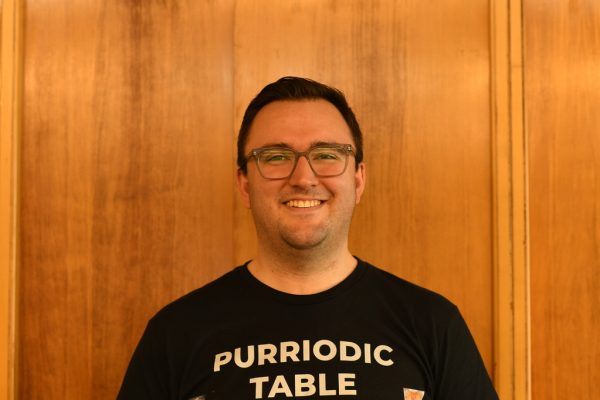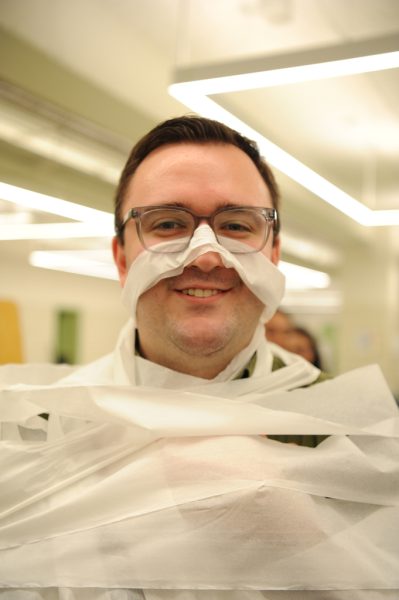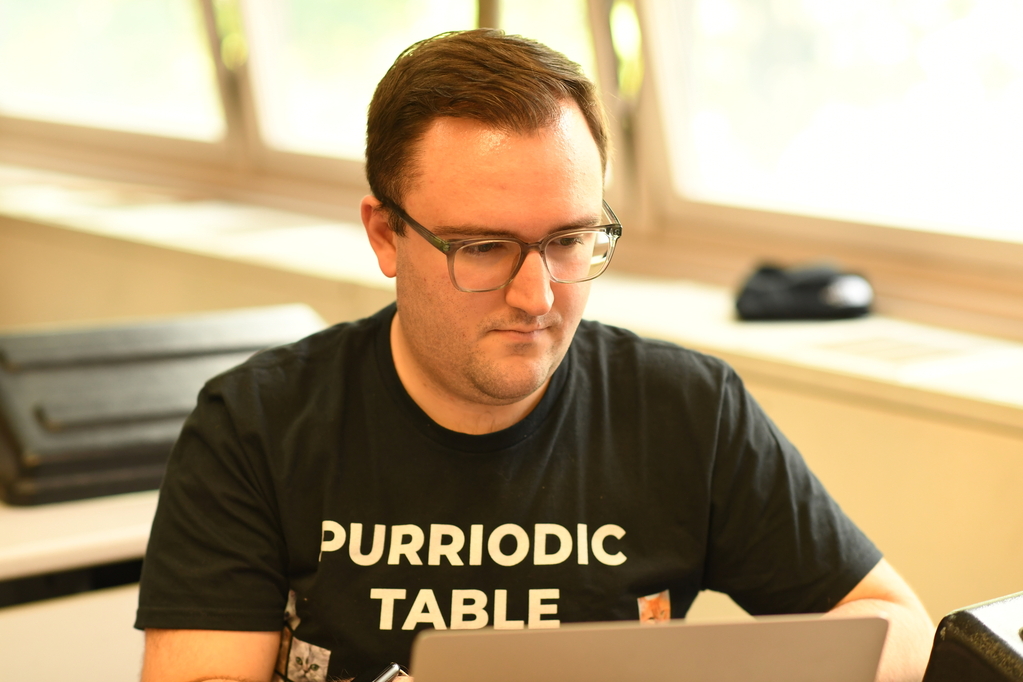The Coordinator of Student Affairs, or COSA is an integral part of the gears of the Bronx Science student body, overseeing the whole of the Bronx Science student government or Student Organization (S.O).
This includes meeting with the S.O. Cabinet, Wolverine TV team, and LOP directors daily. Each branch has its own responsibilities, the S.O. Cabinet organizes school-wide spirit days, blood drives, and holiday festivities; Wolverine TV directs and produces a weekly school news broadcast; and the LOP organizes club fairs, charters new clubs, and monitors the attendance of existing ones.
Running student activities is a large task, from planning school events like the Halloween Monster Mash and the Spring Carnival to running additional student efforts, such as the nutritional health council and judicial board.
This September, due to Ms. Parness’ departure, Bronx Science welcomed a new COSA, Kubiak. Kubiak uses they/he pronouns and prefers to be referred to by his last name alone. They have been a Regents and Advanced Placement Chemistry teacher at Bronx Science for the past three years.
The following is a transcript of my interview with Kubiak regarding his successes and struggles during their first few weeks in the new position. I asked him about his goals, experience, and what he is most excited about taking on. The transcript of the interview has been edited for clarity.
LG: “What’s your background like? Where did you work before Bronx Science? How has teaching here been different?”
JK: “This is my 10th year teaching, which is a huge milestone because I never thought I would make it past the first year. I taught at a school in Brooklyn, sort of, Queens my first year. Literally, the office was in Brooklyn but my classroom was in Queens, so it was right on the border. There I taught chemistry and a section of biology. Then I taught at a school in East Harlem for six years before coming here. There I taught chemistry, honors chemistry, and a food chemistry class. This is now my third year at Bronx Science.
Teaching here has been different because I feel like, no matter where I have been in New York City, students have been pretty similar in terms of their personalities. I would say at Bronx Science, the nerdiness and the drive to really understand chemistry and to understand everything they are doing in all of their classes, I see that, it’s palpable, and it’s really refreshing. It’s really fun to work with students who are really motivated to push themselves and ask deep questions that I often don’t know the answer to.”

LG: “What were you like in high school? How does that affect how you relate to your students?”
JK: “I was totally different in high school. I was a theater nerd so I did all the plays and the musicals. I was in the National Honor Society and drama took up a lot of my time. We had rehearsals on weekends and every day after school. I performed, I was in every play. In my senior year, I was the stage manager for Peter Pan, but I was also the crocodile, so I had a little cameo but not a full role, or any lines. I wanted a bit of a break as I was finishing high school.
I took a lot of AP classes, almost as many as my school would offer, but my school didn’t offer nearly as many as Bronx Science. I was my high school valedictorian. In my speech I made fun of my teachers but in a lighthearted way.
I was bullied in high school for being gay and that was not the greatest. In middle school, it was pretty outright, but it became more covert. People would say things to you and you knew they were making fun of you but it wasn’t direct. That was really hard to deal with.
I grew up in a really small, conservative town in Michigan, so that was the norm, making fun of LGBTQ people. That was considered fun and funny. Growing up in that, you kind of realize you have to do it to acclimate and assimilate and it’s not great. But coming out of that, going to college, and moving to New York luckily was a nice escape.
I think for how I relate to students I remember that I was really misunderstood in high school and I try to approach all my relationships with students as you know, listen to what students are saying and take what they are saying at face value. But also, there can be deeper things going on and it’s okay to ask ‘Are you okay?’ I ask a lot of students that, and sometimes the answer is yes, and sometimes it’s no. I think I focus on treating my students as humans first because I didn’t always feel that I was treated that way as a student.
I mean I had incredible teachers who really pushed me and I had good relationships with so I want to emulate them, but I really want to be the out, queer teacher that I didn’t have as a student.”
LG: “How did you become the new COSA?”
JK: “I was approached by Ms. Cooper (Assistant Principal, Organization) and Mr. Morrell (Assistant Principal of the Physics, Chemistry, and Math Departments) because they thought that I would be a good fit. They were looking for somebody who could have good relationships with students, be able to advocate for their needs, and be a support system. They must have recognized the work that I have done in building good relationships with students and my dedication to our school community.
I was a little hesitant at first because I wasn’t sure what the workload would be like and what all of the minutia and expectations were. After talking to Ms. Parness about the role, everything she liked, and everything that she did, it sounded like it was a really good fit for me. The initial hesitation or the imposter syndrome of ‘I can’t do this” or ‘I’m not good enough’ kind of went away.”
LG: “Did you know what you were taking on? What are some of your responsibilities, aside from the most obvious like Cabinet, Wolverine TV or LOP?”
JK: “I’m still learning about what all the little things are but it’s a lot of emails and a lot of things are passed through me when they are trying to get started at the school. Approval for things, like everything in LOP, goes through me. Also, everything that S.O. is doing, like the little tiny things ‘Can we send this email?’ ‘Can we do this event?’ ‘Can we stay after school this day?’ For Wolverine TV, I am trying to find them a space to work in, and in general, find out what problems there are and what I can do to creatively solve them.”
LG: “What are some new ideas or initiatives you would like to implement, whether for SO Cabinet, LOP, or student life in general?”
JK: “I think that just in general traditions are good but if all we do are things that we have always done, I think it can be stagnant and can grow tiresome. I want to be open to new ideas and ways of doing things that haven’t been done before.
One thing that I think we are going to be planning for later this year is a pride event in June, potentially with alumni or with the GSA. I’m not really sure what all those details are but that is something we have been thinking about, and Ms. Coufos (President, Strategy and External Affairs, Bronx Science Foundation) approached me with that idea. So I’m excited about that.
For Wolverine TV specifically, I’m working on keeping it fun and fresh. They have been doing such a great job of putting out new things. With LOP, I don’t know what specifically, but just figuring out what the processes are, and how we can streamline them.
Overall my main focuses are how we can make things more transparent and easier for us to deal with. Just in general making things easier and as best as they can be.”

LG: “What’s a school event or project you are most looking forward to this year?”
JK: “I am really looking forward to being involved in the election in the Spring for all of the SO Cabinet and such. Also the selection for LOP, and Wolverine TV. All of that I’m really excited about because I have no idea how it works and I’m curious to know what it will look like, if it will be fun, and I think it will be. I nerd out about weird things like that. Bureaucracy sometimes can be fun.”
LG: “Do you think you are going to be able to make tough decisions when it comes to picking students for certain roles?”
JK: “I think so. I have been teaching a long time and have been involved in things where I have had to make really hard decisions. I think making hard decisions is not foreign to me. I feel comfortable doing that and I think that is part of the reason they asked me to do this because part of it is making decisions and thinking or questioning, ‘Is this a good decision or is this a bad decision?’ and then making a good decision.”
LG: “Can you talk a bit about your choice to go by Kubiak, without a prefix? When did you make that choice?”
JK: “I went by Mr. Kubiak until the pandemic. I think the pandemic made a lot of people stop and think about themselves, the world, everything. You had a lot of time to stop and think and I was just thinking about my gender identity. I’m mostly masculine but there are some feminine parts to me. Identifying as a man is mostly true and I wouldn’t say I identify as a woman but I don’t identify fully as a man.
I kind of think of myself as a non-binary man, if that makes sense. In thinking about that I was thinking about what pronouns make sense to me and I think that’s why they/them and he/him kind of work. Depending on the space I am in, I change the order.
If I am in a fully queer space I generally use they/them. At Bronx Science, my email signature says they/he. Sometimes I will only introduce myself as he/him because I don’t want to even introduce that.
I always knew in the background that I felt uncomfortable with being called “Mr.”. In some of the schools I was at before, a lot of students would only call you Mister or Miss. and so I was called “Mr.” a lot and I was like, ‘I don’t like this.’ When it was attached to Mr. Kubiak I felt better and I really like my last name so I figured, I don’t like the ‘Mr.’ but I like my last name so I will just go by Kubiak.
I know that a lot of people think that in order to respect adults and teachers, you have to have the honorific. I think for a lot of people that’s true but for me, it’s respectful to just use Kubiak and leave out the Mr. I really don’t like when people call me Sir, I cringe a little bit.
Part of it is also, to be totally honest, just to be more visibly queer and out for students in a way that I didn’t get to see as a student, and I think it’s important that students see that. A lot of the reason I teach is to be there for LGBTQ kids. Also, chemistry because I love chemistry.”
“A lot of the reason I teach is to be there for LGBTQ kids. Also, chemistry because I love chemistry,” said Kubiak.

